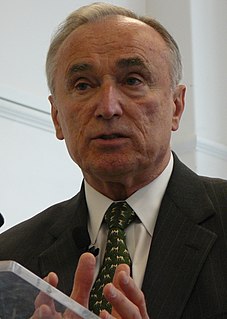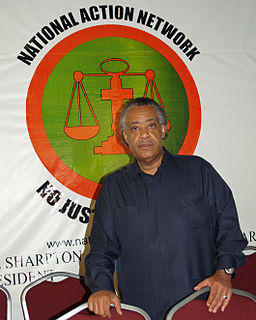
Brown University is a private Ivy League research university in Providence, Rhode Island. Founded in 1764 as the College in the English Colony of Rhode Island and Providence Plantations, Brown is the seventh-oldest institution of higher education in the United States and one of the nine colonial colleges chartered before the American Revolution.
Racial profiling is the act of suspecting, targeting or discriminating against a person on the basis of their ethnicity or religion, rather than on individual suspicion. Racial profiling often involves discrimination against minority population and is based on any negative stereotypes of the targeted demographic. Racial profiling, however, is not limited only to an individual's ethnicity, race or religion and can also be based on the individual's nationality. In European countries, the term ethnic profiling is also used instead of racial profiling.
A Terry stop in the United States allows the police to briefly detain a person based on reasonable suspicion of involvement in criminal activity. Reasonable suspicion is a lower standard than probable cause which is needed for arrest. When police stop and search a pedestrian, this is commonly known as a stop and frisk. When police stop an automobile, this is known as a traffic stop. If the police stop a motor vehicle on minor infringements in order to investigate other suspected criminal activity, this is known as a pretextual stop. Additional rules apply to stops that occur on a bus.
The Orangeburg massacre refers to the shooting of protesters by South Carolina Highway Patrol officers in Orangeburg, South Carolina, on the South Carolina State University campus on the evening of February 8, 1968. The approximately 200 protesters had previously demonstrated against racial segregation at a local bowling alley. Three of the protesters, African-American males, were killed and 28 other protesters were injured.

Raymond Walter Kelly is the longest serving Commissioner in the history of the New York City Police Department (NYPD) and the first man to hold the post for two non-consecutive tenures. According to its website, Kelly — a lifelong New Yorker—had spent 45 years in the NYPD, serving in 25 different commands and as Police Commissioner from 1992 to 1994 and again from 2002 until 2013. Kelly was the first man to rise from Police Cadet to Police Commissioner, holding all of the department's ranks, except for Three-Star Bureau Chief, Chief of Department and Deputy Commissioner, having been promoted directly from Two-Star Chief to First Deputy Commissioner in 1990. After his handling of the World Trade Center bombing in 1993, he was mentioned for the first time as a possible candidate for FBI Director. After Kelly turned down the position, Louis Freeh was appointed.

William Joseph Bratton CBE is an American law enforcement officer and businessman who served two terms as the New York City Police Commissioner. He previously served as the Commissioner of the Boston Police Department (BPD) (1993–1994) and Chief of the Los Angeles Police Department (LAPD) (2002–2009). He is the only person to have led the police departments of the United States' two largest cities – New York and Los Angeles.

The National Action Network (NAN) is a not-for-profit, civil rights organization founded by the Reverend Al Sharpton in New York City, New York, in early 1991. In a 2016 profile, Vanity Fair called Sharpton "arguably the country's most influential civil rights leader".
Crime rates in New York City spiked in the 1980s and early 1990s as the crack epidemic surged, and then dropped from 1991 to 2019, giving New York City one of the lowest crime rates of major cities in the United States.
The New York Civil Liberties Union (NYCLU) is a civil rights organization in the United States. Founded in November 1951 as the New York affiliate of the American Civil Liberties Union, it is a not-for-profit, nonpartisan organization with nearly 50,000 members across New York State.

Providence Village is a new town in Denton County, Texas, United States. Composed largely of a master-planned community, it includes approximately 1,700 homes and 5,750 people. At the time of the 2010 census, the town had not yet incorporated, and was instead listed by the U.S. Census Bureau as the "Providence" census-designated place, with a population of 4,786.

Christina Hull Paxson, known as CPax, is an American economist and public health expert, currently serving as the 19th President of Brown University. Previously, she was the Hughes Rogers Professor of Economics & Public Affairs at Princeton University as well as the Dean of Princeton School of Public and International Affairs.
The American Civil Liberties Union of New Jersey (ACLU-NJ) is a nonpartisan, not-for-profit civil rights organization in Newark, New Jersey, and an affiliate of the national American Civil Liberties Union. According to the ACLU-NJ's stated mission, the ACLU-NJ operates through litigation on behalf of individuals, lobbying in state and local legislatures, and community education.

Cameron Whitten is an American community activist best known for advocacy on affordable housing, racial justice, and LGBT rights.
The stop-question-and-frisk program, or stop-and-frisk, in New York City, is a New York City Police Department practice of temporarily detaining, questioning, and at times searching civilians and suspects on the street for weapons and other contraband. This is what is known in other places in the United States as the Terry stop. The rules for the policy are contained in the state's criminal procedure law section 140.50 and based on the decision of the US Supreme Court in the case of Terry v. Ohio.

Floyd, et al. v. City of New York, et al., 959 F. Supp. 2d 540, is a set of cases addressing the class action lawsuit filed against the City of New York, Police Commissioner Raymond Kelly, Mayor Michael Bloomberg, and named and unnamed New York City police officers ("Defendants"), alleging that defendants have implemented and sanctioned a policy, practice, and/or custom of unconstitutional stops and frisks by the New York Police Department ("NYPD") on the basis of race and/or national origin, in violation of Section 1983 of title forty-two of the United States Code, the Fourth and Fourteenth Amendments to the United States Constitution, Title VI of the Civil Rights Act of 1964, and the Constitution and laws of the State of New York.

The Brown Political Review (BPR) is a quarterly, student-run political magazine and website at Brown University in Providence, Rhode Island. It covers the politics of regional, domestic and international affairs, the political culture and dialogue at Brown and the ongoing state of political journalism in the United States. BPR is managed and edited by undergraduate students of Brown University, and features writing from staff contributors and submissions from the Brown community. The magazine also features original interviews and media productions, as well as student artwork from Brown and the nearby Rhode Island School of Design. It is sponsored by Brown University’s Political Theory Project.

The Ferguson unrest in Ferguson, Missouri, involved protests and riots beginning on August 10, 2014, the day after the fatal shooting of Michael Brown by police officer Darren Wilson. The unrest sparked a vigorous debate in the United States about the relationship between law enforcement officers and African Americans, the militarization of police, and the use-of-force law in Missouri and nationwide. Continued activism expanded the issues to include modern-day debtors prisons, for-profit policing, and school segregation.
Joseph Charles Jones was an American civil rights leader, attorney, co-founder of the Student Nonviolent Coordinating Committee (SNCC), and chairperson of the SNCC's direct action committee.

The New York City Police Department (NYPD) actively monitors public activity in New York City, New York, United States. Historically, surveillance has been used by the NYPD for a range of purposes, including against crime, counter-terrorism, and also for nefarious or controversial subjects such as monitoring political demonstrations, activities, and protests, and even entire ethnic and religious groups.
The Museum of Broken Windows is a pop-up exhibition organised by the New York State affiliate of the American Civil Liberties Union. Housed within the Cooper Union's Foundation Building on Cooper Square, the project has been displayed twice, first from 22 - 30 September 2018 and then again between September 13 and October 8 2019.











